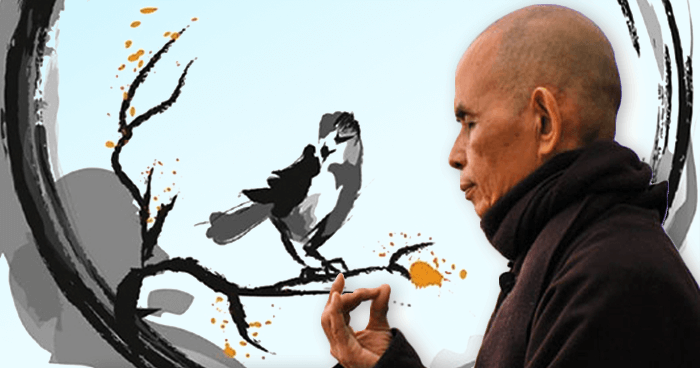Thich Nhat Hanh's wordsThich Nhat Hanh explains the core of Zen Buddhism in simple elegant language. Here are the favourite sayings collected by one of our Buddhist Sangha members. |
一行禪師慧語一行禪師以簡潔智慧的語言講解佛教禪宗的精義。 以下是尋道會佛教共修一位成員的收集。(中文版譯自英文版) |
|
Our true nature is the nature of no birth and no death.
from No Death, No Fear p7 |
我們真正的本質是無生無死。
|
|
Looking deeply, we should also see that there is no birth, there is no death; there is no coming, there is no going; there is no being, there is no non-being; there is no same, there is no different. from No Death, No Fear p14 |
深入地思考,我們可察覺本來無生、無死;無來、無去;無有、無非有;無同、無異。 |
|
When all ideas of is and is not have been extinguished, then reality will manifest itself. from No Death, No Fear p15 |
破除一切「是」及「非是」的觀念,本相便會自我呈現。 |
|
Nirvana is empty of all notions, including the notion of nirvana. from No Death, No Fear p20 |
涅槃就是倒空所有慨念,包括「涅槃」這慨念。 |
|
Impermanence means that everything changes and that nothing remains the same in any consecutive moments. from No Death, No Fear p40 |
「無常」指所有事物都在變化,沒有一樣在下一刻仍然相同。 |
|
Impermanence is looking at reality from the point of veiw of time. No self is looking at reality from the point of view of space. They are two sides of reality. No self is a manifestation of impermanence, and impermanence is a menifestation of no self. If things are impermanent, they are without a separate self. If things are without a separate self, they are impermanent. Impermanence means being transformed at every moment. This is reality. from No Death, No Fear p46 |
「無常」是在時間的視角看本相;「無我」是在空間的視角看本相。它們是本相的兩面。「無我」是「無常」的呈現;「無常」是「無我」的呈現。既然物件是無常,它們便沒有分別的「我」;既然物件沒有分別的「我」,它們便是無常。「無常」指無時無刻不斷變化。這就是真相。 |
|
Consciousness, just like perceptions, feelings and mental formations, is just a manifestation. When conditions are sufficient, these manifestations are present. When conditions are no longer sufficient, these manifestations are no longer present. Present or not present, these manifestations are not me. from No Death, No Fear p182 |
意識,就好像知覺、感受、和思想形成一樣,只是一種呈現。當條件許可,它們就存在;當條件消失,它們也消失。無論存在或消失,這些呈現都不是「我」。 |
|
When you are capable of touching yourself deeply, and touching others deeply, you touch the other dimension, the dimension of the ultimate reality. from Going Home: Jesus and Buddha as Brothers p4 |
當你能夠深度地接觸自己,與及深度地接觸他人,你便接觸到另一個層面,終極真相的層面。 |
|
The practice of looking deeply reveals to us that one thing is made up of all other things. One thing contains the whole cosmos. from Going Home: Jesus and Buddha as Brothers p5 |
練習深度地觀看,我們便看到某一樣事物是由其他所有事物構成,某一樣事物已包含整個宇宙。 |
|
Mindfulness is the energy of the Buddha. The Holy Spirit is the energy of God. They both have the capacity to make us present, fully alive, deeply understanding, and loving. from Going Home: Jesus and Buddha as Brothers p5 |
專注是佛的能力;聖靈是上帝的能力。它們都有能力使我們活在當下、深刻地理解、和去愛。 |
|
If we do not live each moment deelply, there is no way we can touch the ultimate dimension, the dimension of the noumena. from Going Home: Jesus and Buddha as Brothers p5 |
如果我們不深度地活在當下,我們便不能接觸到終極的層面、本體的層面。 |
|
Paul Tillich said that "God is the ground of all being." The "ground of being" is the noumenal aspect of reality. God is not a being in the phenomenal world. He or She is the ground of being. It would not be difficult for Christians and Buddhists to agree on this. from Going Home: Jesus and Buddha as Brothers p7 |
田立克(蒂利希)說:「上帝是存在的基礎」。「存在的基礎」是真相的本體一面。上帝不是現象世界裡的存在者。祂是存在的基礎。基督徒與佛教徒都不難同意這點。 |
|
When we ask, "Is God a person or is God not a person," we get lost. In fact, God is not a person, and God is not a non-person. There is a German theologian who expresses this very beautifully: "God is not a person, but not less than a person." It is a very Zen-like statement. from Going Home: Jesus and Buddha as Brothers p12 |
當我們問:「上帝有沒有位格(人格)?」,我們便迷失。事實上,上帝不是有人格,上帝又不是沒有人格。一位德國神學家美妙地形容:「上帝不是有人格,上帝絕不低於人格。」這句話很禪。 |
|
When a person's speech is full of anger, it is because he or she suffers deeply. from Anger p3 |
當一個人的說話充滿憤怒,這是因為他/她受的苦很深。 |
|
To understand and transform anger, we must learn the practice of compassionate listening and using loving speech. from Anger p3 |
要明白及轉化憤怒,我們必須學習慈悲地聆聽及以愛心說話。 |

